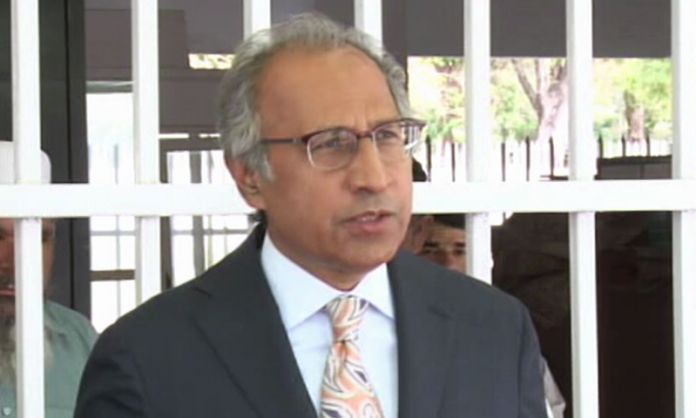- PM’s adviser says the IMF programme will create a platform for sustainable macroeconomic stability in Pakistan
- Says it is not in govt’s hands to control oil prices, as they are determined internationally
ISLAMABAD: Adviser to Prime Minister on Finance Dr Abdul Hafeez Shaikh said on Friday that the upcoming budget for the fiscal year 2019-20 would focus on bringing about macroeconomic stability in the country, adding that the government also intends to introduce reforms that could uplift the vulnerable segments of the society.
“The budget will comprise measures to address issues pertaining to fiscal and monetary policies so that sustainable growth could be ensured,” the adviser maintained while addressing an investment conference in Islamabad.
He said that the government was committed to ensuring fiscal discipline, improving macroeconomic policies and engaging with the rest of the world.
He acknowledged that inflation was an issue the government was worried about but said it was not in the hands of the government to control the prices of oil and other things, as they are determined internationally.
Terming inflation as bad tax, the advisor said the government was trying to manage this threat. Owing to the election manifesto and ideology of the ruling party, the government would focus on social safety nets for the welfare of vulnerable and week segments, he added.
“As we go forward, we have to find more resources to alleviate poverty and reach out to those who are left behind in our society,” he stated.
The adviser said that there would be an enhancement in social safety programmes, which have been integrated under the umbrella of Ehsas programme. He, however, was of the view that smart thinking and utilization of modern technology was required to ensure that the money goes into the hands of the right people.
Shaikh also highlighted the importance of privatization to realize the full potential of companies under public control, saying that if these were not managed by bureaucracy, then there was a need to find a way forward.
He noted that between the calendar year 2003 and 2006, around 34 companies were privatized, adding that these earned around $4 to $5 billion for the national exchequer within three years. He, however, lamented that since early 2006, not a single company was privatized.
On negotiations with the International Monetary Fund (IMF), the adviser said that the fund exists as an international institution helping economies that face macroeconomic imbalances.
He said that the government was in negotiations with the fund and would ensure that a reasonable programme was reached, which would create a platform for sustainable macroeconomic stability.
The programme would also ensure an enhanced relationship with international players such as the World Bank, Asian Development Bank, Islamic Development Bank and the country’s bilateral friends.




